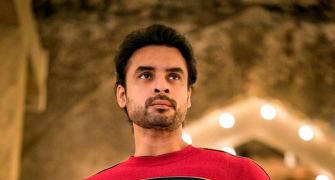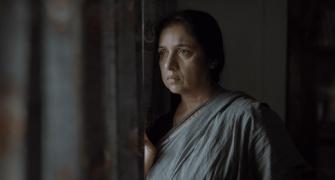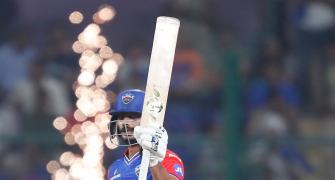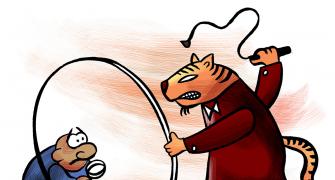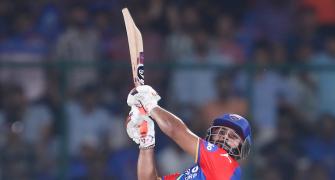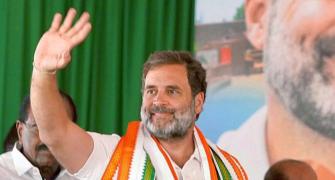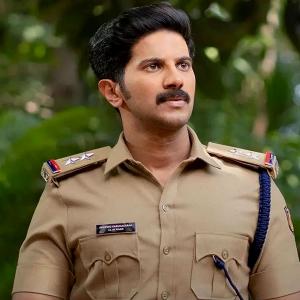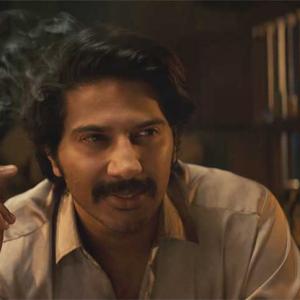'We like to look at a screenplay as a spiral staircase.'
'You never know what awaits at the next turning.'

The brothers Bobby and Sanjay are arguably the most relevant and original screenplay writers in Indian cinema today.
Functioning exclusively in Malayalam cinema, Bobby-Sanjay's screenplays in Ente Veedu Appuvinteyum, Traffic, Notebook, Mumbai, Uyare, Salute and Kannekkanne have earned the brothers the position of being the rightful heirs of Salim-Javed's legacy.
Subhash K Jha catches up with Bobby and Sanjay in a rare conversation.
The names Bobby-Sanjay have come to mean explosive extraordinary screenplays in Malayalam. How do you react to the reputation that your stunning screenplays have created?
Bobby: We see it as the fulfillment of a childhood dream of ours to make it big in cinema. At first, our fascination was for the entertainers of those times, mostly Malayalam and Hindi films.
Though we generally don't write such films ourselves, they were our foundation stones which led us to the world of cinema.
We never intended to carve a path for ourselves as screenplay writers. It just happened so. Probably the audience could relate well to our stories.
Sanjay: I am happy and grateful that most of our screenplays have been accepted by the audiences and critics.
When we approach a movie we look for themes that elevate us as writers and human beings.
Personally, the writing process is a purging experience that makes me happy.
So when people accept our movies it is a confirmation for me that whatever I went through during the writing has resonated well with the audiences. That for me is great fulfilment.
I don't mean this in terms of just huge box office success. Sometimes it's about reaching and being accepted in spaces that we wanted it to be.

I have watched nearly all the films that you two have written from Ente Veedu Appuvinteyum to the recent Salute. I see no connecting pattern in your writing. Who are your influences as screenwriters?
Bobby: We try to make sure that no two films of ours are similar in any way. And it is more challenging to us as writers to create different stories with different premises.
Sanjay: We try not to go back to stories that we have explored once. It's a space we have already inhabited and repeating it could be monotonous without offering anything new.
New atmosphere and ambience are what make writing exciting because you are there for the first time and you are discovering new things along the way.
For me, all kinds of cinema -- world and Indian -- have been a great inspiration. There are many writers and screenplays which have had great influence on me.
Also, my reading has helped me a lot when it comes to characterisations and depth.
Certain people I meet, certain incidents and moments that I come across, news articles; I get material from almost everything and everywhere.
Observing life is what I generally do to find stories.
The closest parallel that I see to your collaborative screenwriting superstardom are Salim and Javed who blazed a trail in Hindi cinema in the 1970s and 1980s. What do you think of Salim and Javed? You have the same clout in Malayalam cinema that they did.
Bobby: Personally, I have been greatly inspired by writers like P Padmarajan, M T Vasudevan Nair and Salim-Javed. Their characterisations, dialogues and build-up of the plot points have influenced me very much.
Sanjay: Salim Javed are among our favourites and we have watched all of their movies. Most of them, at least thrice or even more.
I feel when it comes to Indian commercial cinema, they are the greatest and to be compared with them is almost embarrassing because we very well know that we are nowhere near. Their screenplays are text books for any film student.
And no, we don't exercise the same clout they did and we never will. They are HUGE!
Tell me about your beginning as writers. How did the two of you decide on writing together? You are from a film family, but was it tough getting your first few breaks?
Bobby: We studied in Corpus Christi School, which was run by Mrs Mary Roy (whose daughter is novelist Arundhati Roy). She was very keen that all students should try and develop their artistic skills.
We used to write and direct plays during those times. Our school has helped us a lot in that way.
Initially, we never knew which career to choose in films, but by the late '90s, we realised screenplay writing was our best choice.
Sanjay: Our father Prem Prakash is a film producer and he was very prolific during our childhood and teenage years. We were practically born into movies.
Our mother, who was an English teacher, insisted that we read. So it was a potent combination of movies and books.
For as long as I can remember I wanted to be in the movies and it was a coincidence that both of us loved writing.
So it was a pretty organic decision that we would write together.
After college I went on to be an assistant director to the very popular film-maker Kamal.
Our first break did not come painlessly. Even our father rejected a few of our screenplays.
We started with a TV serial Avasthandarangal, which our dad produced.
Later, fortunately for us, he liked the script of Ente Veedu Appoontem and produced it.
The fact that we started with a director like Siby Malayil helped us and our career to take off.
Ente Veedu Appontem did well at the box office and luckily from there we didn't have to struggle much for work.
How do you brothers collaborate? I ask this because writing is such an isolating endeavour. Then, how do you ideate and write together?
Bobby: This is the question we have answered the most number of times.
We have a rapport which enables good discussions and sharing of ideas and thoughts.
We do have differences of opinion while on scripts, but we settle for what is best for the film.
We also feel two brains are better than one when it comes to writing since one person may come up with an idea which the other person may not have thought of.
Sanjay: Yes, writing indeed is work done in isolation and we do exactly that! We work separately on each story and come together for discussions to share each other's thoughts.
This gives more layers and dimensions to the story.

My favourite script of yours is Mumbai Police. The last half hour when Prithviraj's character's sexual orientation is revealed was a shocker. Do you purposely construct the plot into a shocker? Is there an element of emotional manipulation in your writing to sustain drama?
Bobby: I feel drama should be included in a script without affecting its flow and logic. Minus drama, any movie will be dry and boring.
We usually build a story and try to include dramatic situations which easily gel with it. If it is forced, it will negatively affect the storytelling process.
At the same time, a screenplay without drama, conflict or unexpected turning points will most likely be a disaster.
Sanjay: Real life is always our raw material. We try to find the extraordinary in the ordinary. What seems simple need not always be simple. That's basically our theory as writers.
When we feel a spark in a thought or a story we sleep on it for a while to see if it stays with us. If it doesn't, we don't pursue it.
A theme or a thought has to really haunt us or compel us into writing it.
There are times when a thought strikes and we feel it is brilliant, but the next morning we wake to find it does not excite us at all. If the excitement stays, then we make it into a movie.
We approach a screenplay not just as writers, but as the audience too. We make sure that the audience in us is completely happy with whatever we have written. So perhaps the tension is the result of that.
I am not sure if manipulation is the right word. We basically travel with the story and character and think of the various paths it could go. But we make sure those paths are logical and in tune with the story and character.
We like to look at a screenplay as a spiral staircase. You never know what awaits at the next turning.
I feel that's what makes every story interesting. 'What next?' is something we are constantly aware of while writing a movie.
Seeing your impeccable craftsmanship, why are you two restricted to Malayalam cinema. Bollywood needs you desperately.
Bobby: Bollywood is an industry totally different from ours. In fact, our movies have been remade in Hindi and we would love to work there. But we would need a person well versed in Hindi to translate our dialogues.
While a normal Malayalam film generally takes less than a year from pre-production to release, Bollywood films may take years to happen. That too is a constraint for us.
Of course, if everything falls into place, we are definitely interested.
The pan-Indian reach of Bollywood films are huge compared to Malayalam, and as writers it would be a big opening for us.
Sanjay: We have lot of commitments here in Kerala. We would definitely want to try a hand in Bollywood if we are given the creative freedom that we enjoy here.
We are huge fans of Hindi cinema and Hindi music from childhood. So if everything falls into place we might write a Hindi movie.
I believe you have brought a revolution in the pay scales for writers in cinema. Why do you think writers are so monstrously underpaid in Indian cinema?
Bobby: I feel the situation has changed. Writers are paid well these days. Probably the reason why they were/are paid less is that a movie is marketed mainly on its star cast.
People on the technical side are given less importance because they work unseen. But now the scene is surely changing since the audience look at who the director and writer are before deciding to watch a movie.
Sanjay: I think things are much better than it was before where a writer's job was considered to be clerical.
In Kerala, writers are not only paid well, but also given the respect that's due to them. There is an understanding that content is king.
If you come up with good content, you become a very important part of a movie by default. People listen to you.

Which are your favourite scripts?
Bobby: All our scripts are personal favourites, but if you ask me specifically, I would say Traffic is my most favourite, followed by Ayalum Njaanum Thammil and Kaanekkaane.
I believe that once the remake rights of our script is sold, the concerned writer and director have the right to modify it according to the nativity/sensibility of the language it is remade into.
Sometimes they do ask us to go through the new script, but at the end of the day, they should take the final call.
Sanjay: Personally, I don't have favourites among our movies. Each movie comes with its own experiences and explorations. Each of them is a learning for me both as a writer and as an individual.
There is a kind of discovery that happens with each. For me, we have tried different genres and each genre comes with its own challenges.
As I said earlier, writing for me is not just about the outcome, but how it affects me as an artist.
You seem to have a special rapport with Rosshan Andrews? Why? Who are the other film-makers you like working with?
Bobby: Roshan is like a younger brother to me. We have known each other since the last 25 years. The way he approaches a script is amazing. He is always full of energy and will go to any extent to make a perfect film.
Our script is like our baby, and once we hand it over to Roshan, we are assured that it is in the safest of hands. Another director whom we enjoy working with is Manu Ashokan.
Sanjay: Roshan and I go a long way back. We were assistant directors together.
There is a great deal of understanding between us and that makes our collaboration smooth and enjoyable. We have a common outlook towards cinema. I feel we come from the same school.
We have enjoyed working with every director of ours.
What are your forthcoming projects?
Bobby: We take an average of six months to write a screenplay. There have been ones which took us more than a year too.
Our forthcoming films are with Rosshan Andrrews, Manu Ashokan and Vivek (Athiran).
Sanjay: We take a long time to complete a screenplay. We do a lot of research and we write at least three drafts. It could take anywhere between 8 months and one year.
Feature Presentation: Ashish Narsale/Rediff.com


